296: England investing - Regeneration, Projects, Population, Babyboomers, Employment- insights
11-14-2009
 PropertyInvesting.net team
PropertyInvesting.net team
More objective guidance and insights for property investors. Our aim is to help you improve your investment returns, flag key risk areas and stimulate strategic thought so you can position your portfolio to maximize gain, for the 25,000 daily visitors to the website. This Special Report describes the very best

1. Regeneration – big public and private sector projects that lead to positive change
2. Infra-structure developments – new rail, tube, road, airports etc
3. Major new projects – retail, government, private (e.g. Olympics,
4. Population – areas of expanding population and inward migration
5. Energy scarcity – areas least affected by high oil, gas and energy prices as Peak Oil affects start to kick-in
6. Baby-boomer wealth and retirement – pied-de-tier, second homes, semi-retirement homes, where baby-boomer that have 75% of the
7. Employment – new jobs, new high paid jobs
Beyond any doubt, the largest amount of money being spent on regeneration in the
· 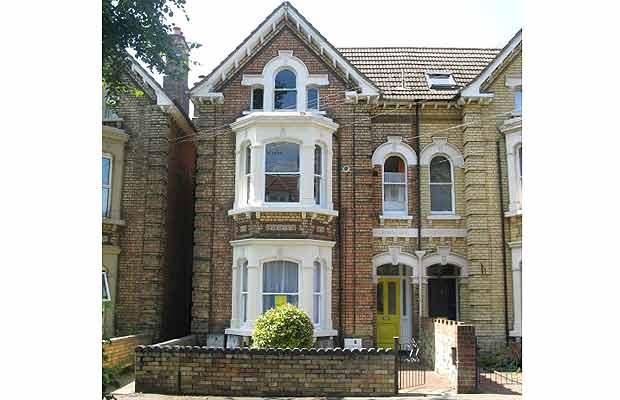
· Nine Elms and Battersea Power Station –
· Brentford –
· New Cross-Deptford-Peckham – SE London
· Barking, Romford, Dagenham –
· Elephant & Castle –
· Croydon –
· Holbeck-Beeston –
· Woolwich – East London
· Docklands and East - Hull
· Docklands – Glasgow
· North Docks, L1, L3, L5 and general -
· Stretford –
·
·
· Brent-Cricklewood – NW
Example 1 - Stratford: The list above are not all regeneration projects, but they probably capture about 80% of the key projects. About half are in 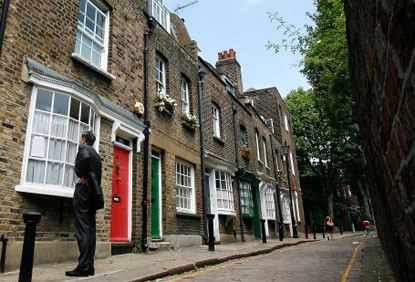 r attain the giddy heights of
r attain the giddy heights of
Example 2 – Nine Elms: This is an important new large regeneration project. Nine Elms is an area 1½ miles long and ½ mile wide that runs north-south along the Thames South Bank (or East Bank) in 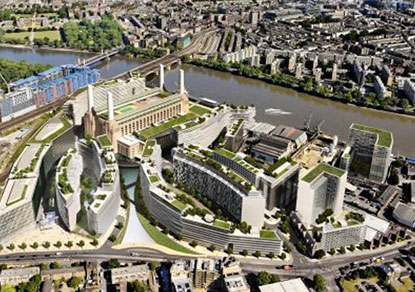 will work well in the SW11 and SE11 Battersea-Vauxhall-Lambeth-Kennington areas in the next ten years. In essence, central
will work well in the SW11 and SE11 Battersea-Vauxhall-Lambeth-Kennington areas in the next ten years. In essence, central
Infra-structure developments – new rail, tube, road, airports. Again,
·
· Dockland Light Rail extension: Woolwich Arsenal
· Crossrail: West to East Rail Link (see map below)
· Heathrow: Terminal 5 (and potential second runway)
· Battersea Tube Station: plan for 2015
· Eurostar: St Pancras,
· Eurostar:
Our guidance is for serious property investors to review the maps on our website a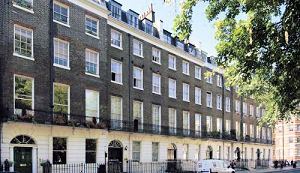 nd look at overlapping spheres of influence with regard to how the new stations link with new offices, jobs, developments and proximity to retail and leisure activities. An example is Bow in
nd look at overlapping spheres of influence with regard to how the new stations link with new offices, jobs, developments and proximity to retail and leisure activities. An example is Bow in
Population
If the population increases and new housing cannot keep up with demand, property prices and rental prices will rise. This we believe is true on  less 400,000 new homes are created – supply will not keep pace with demand and prices will rise. We also expect acute shortages of property in
less 400,000 new homes are created – supply will not keep pace with demand and prices will rise. We also expect acute shortages of property in
Energy scarcity
Peak Oil is definitely worth serious consideration. We believe maximum oil production took place July 2008 and  we are now on a bump plateau until 2015 after which oil production will drop. Because global oil demand is likely to rise by 1 to 2% per annum henceforth, in a year or so, oil prices will sky-rocket as supply cannot keep up with demand. Speculators will probably drive prices even higher than they would normally go – in part driven by the investment herd instinct. When oil prices rise above $100/bbl, the
we are now on a bump plateau until 2015 after which oil production will drop. Because global oil demand is likely to rise by 1 to 2% per annum henceforth, in a year or so, oil prices will sky-rocket as supply cannot keep up with demand. Speculators will probably drive prices even higher than they would normally go – in part driven by the investment herd instinct. When oil prices rise above $100/bbl, the
For
· Borough London – walking distance to City finance jobs
· Kennington London –walking distance to
· Ebbsfleet-Gravesend-Southfleet – fast electric rail to London St Pancras
· Woking – fast electric rail to
· Luton – fast electric rail to
· Statford – 5min electric train to St Pancras, 12 mins on tube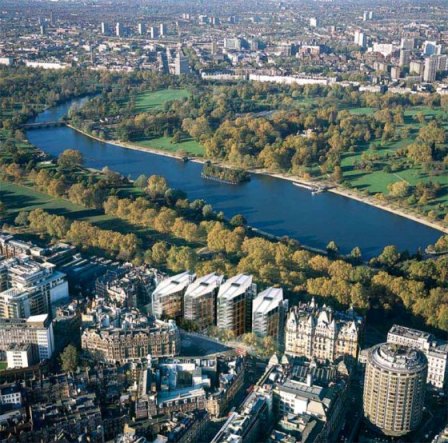
·
· Bayswater – walking distance to
· Shoreditch – walking distance to City jobs
Probably best to avoid areas around Heathrow airport because we expect massive airline lay-offs in future years because of:
· Environmental lobby and climate change
· Tax on aviation fuel
· Increase in aviation fuel prices
· Less inter-continental, European and domestic flights
· No further expansion
· Airlines going bust! (or at best merging and rationalizing)
As long as Peak Oil does not lead to civil disorder,
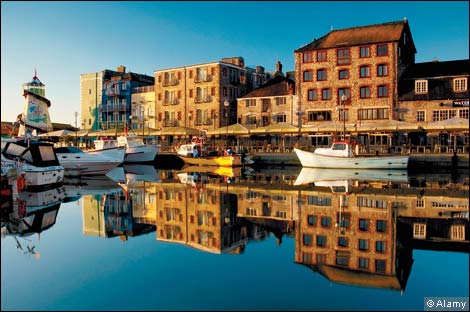
Baby-Boomer Wealth and Retirement
About 75% of wealth resides with the over 45 year old baby-boomer generation. They stole a march primarily through the continuous property price boom from 1994 to 2007. The bulk of the wealth in the UK still resides in property and is likely to in future we believe (let’s face it, it’s very difficult to make serious money on the stock market, wouldn’t you agree?). As these people wealthy retire, they will tend to move to select nice areas – and possibly downsize a bit in the process. People in the north will tend to shift further south to take advantage of better weather (some will move abroad to
Some examples
Inland Coastal Cities
Stratford-On-Avon Southwold Chelsea-Mayfair-London
Wells Swanage

Increasingly older people will be more active – they will want theatre, culture, cafes, restaurants, cinema, shops, history, special interest sites. So it might seem counter-intuitive but Mayfair or
Employment
Proximity to high paid jobs is key to supporting rising property prices. One reason why Battersea, Greenwich, Bayswater, Highbury, Primrose Hill and Borough see prices continuing to rise – these Victorian and Georgian areas are close to the very highest paid jobs in the West End, City and Docklands financial districts. Don’t expect any big change –
·
·
· 
·
· NW Kent (Ebbsfleet)
·
·
Knowledge, finance and technology jobs will become more important – so the areas of Cambridge (M11 corridor), Reading-Maidenhead (M4 corridor) and Southampton-Winchester (M3 corridor) will see more price rises we believe as building levels remain slow to almost non-existent and housing demand increases with more jobs and expanding population.
That’s it. We hope this Special Report has helped frame the importance of Regeneration, Infra-structure developments, Major new projects, Population, Energy scarcity, Baby-boomer wealth and retirement, and Employment. If you have any comments, please do not hesitate to contact us on enquiries@propertyinvesting.net . And please feel free to forward this report particularly to a friends, family or colleagues.
For further Reports on Peak Oil and Resources please click on these links:
· 264: Another oil price spike is just about to hit us...watch out
· 263: Investing in Property with Energy in Mind "post Peak Oil"
· 257: Property investing, the UK economic situation and oil & gas
· 246: Peak Oil - called July 2008 - massive switch needed despite $35/bbl oil
· 244: It's the oil price again - it caused the recession
· 243: Oil price crash sows seed for next massive oil spike
· 242: Oil, Cars & Property - what we'd do if we were UK Prime Minister
· 238: Oil, Cars & Real Estate - what we'd do if we were Pres. Obama
· 191: Oil Price Update and Real Estate
· 187: Real Estate and the commodities super-cycle
· 186: Oil price starts to skyrocket as predicted - how to profit
· 180: Oil prices continue to skyrocket
· 172: Make serious money - best investment sectors
· 169: Oil supply crunch begins… protect yourself
· 168: Alarm bells ringing - oil price shock now on the horizon
· 163: Making Serious Money as asset prices plateau - resources and property
· 161: Resources winners and losers - ranked list for property investors
· 160: Find out the winners and losers in the biggest oil boom in history - about to happen...
· 159: Massive oil boom - the winners and losers - be prepared
· 158: Supply and demand scenarios - oil boom and the property investors insights
· 157: Impact of "Peak Oil" for Property Investment
· 151: Oil price $125 / bbl and rising…how to take advantage in property
· 150: Peak Oil shortly due to be reach - unique insights for a property investor
· 148: Take advantage of the oil/gas/coal boom - key insights
Occasional visitors to UK/London:
Matt Damon 





Alicia Silverstone




